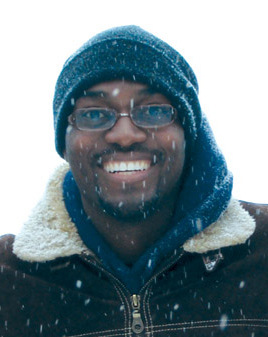 loading
loading
Sporting LifeKeeping his coolAlex Goldberger ’08, an Olympics researcher at NBC, is the sideline reporter for Yale football on WELI.  Amanda FornalAspiring Olympian Seun Adebiyi ’09JD View full imageOn February 5, Seun Adebiyi ’09JD spammed the Yale Law School listserv with an unusual question: “Want to go to the 2014 Winter Olympics?” Adebiyi, Nigerian-born and Alabama-bred, was months from graduation, committed to Goldman Sachs, and a novice at best in any winter sport, but he had a dream: to become Nigeria’s first Winter Olympian, at the 2014 Games in Sochi, Russia. A few classmates responded, and within days Adebiyi convened an exploratory committee. “The general thought,” says Nick Pedersen ’10JD, one of Adebiyi’s co-conspirators, “was, ‘What would be an easy thing to qualify for and what would be fun to do?’” Adebiyi’s Olympic aspirations go back to the Nigerian trials for the 2004 Games, when he just missed qualifying as a sprint swimmer. For 2014, he and his committee settled on skeleton—a masochistic sledding sport that sends a scarcely padded madcap in a headfirst, 80-mile-per-hour plunge down a mile-long ice chute. Two weeks later, Adebiyi and some friends ventured to Lake Placid, one of two skeleton tracks in the country, so he could give it a try. “They were like, ‘This is the sled, this is where you hold on’—and then they pushed you down,” Adebiyi recalls. “It wasn’t scary like I’d expected it to be. All I was thinking was, ‘How can I go faster?’” Having caught the bug, Adebiyi made a plan: he sought out Yale track coach Marc Davis to help him with the 30-meter sprint at the start of the skeleton run, and he arranged for a transfer to Goldman’s Salt Lake City office, near the nation’s only other Olympic track in Park City. The chances are surprisingly good for an athlete like Adebiyi to become an Olympian in skeleton. The quota system of the FIBT—bobsled and skeleton’s international governing body—favors diversity (remember the Jamaican bobsled team?), so nations with large programs, like the United States, offer facilities and training support to warm-weather expatriates. Brian McDonald, who worked with Adebiyi at the U.S. development program in Park City, also trains Iraqi slider Faisal Faisal, who expects to make his Olympic debut this February in Vancouver. “If you do it as a full-time endeavor,” says McDonald, “within five years you can go from never having seen a track in your life to walking into the Olympic stadium.” But the trajectory that sent Adebiyi hurtling down the ice in Lake Placid went off course this summer. In June, he was diagnosed first with lymphoma, then with stem-cell leukemia, and told he would require a bone marrow transplant. “There’s a cruel irony here,” Pedersen says. “If there’s one person who doesn’t need the kick in the ass a cancer diagnosis will give you to make the most of your time on earth, Seun is that person.” From his hospital room in New York in late October, Adebiyi was still harboring hope that after finishing a four-week round of chemotherapy, he could dash to Park City for his skeleton driving certificate before returning for the transplant. “I understand that I have a life-threatening illness, and that the prognosis is quite daunting,” he says. “But this has been an improbable dream from the beginning, so I don’t see any reason why I should stop dreaming now.”
The comment period has expired.
|
|